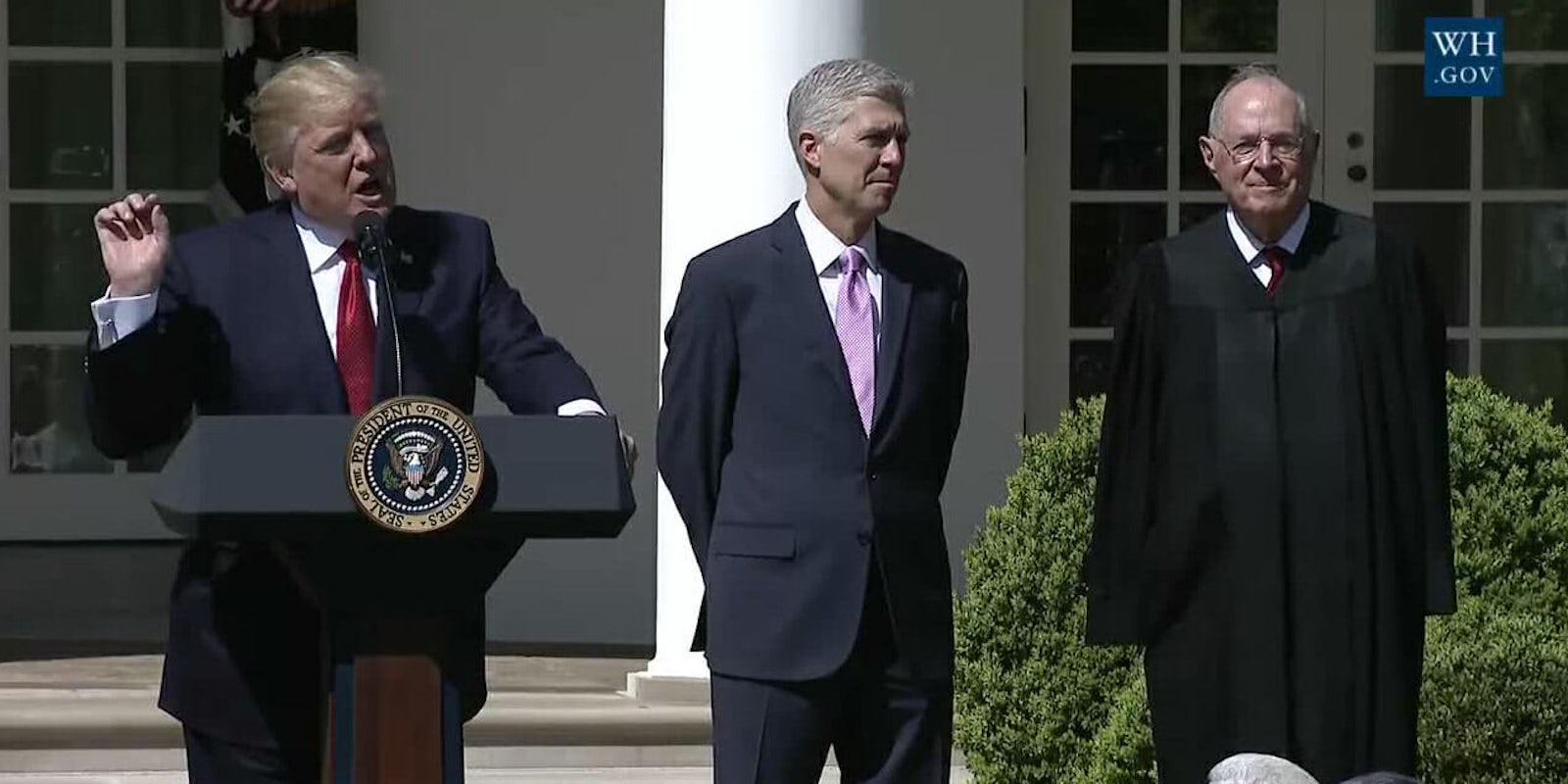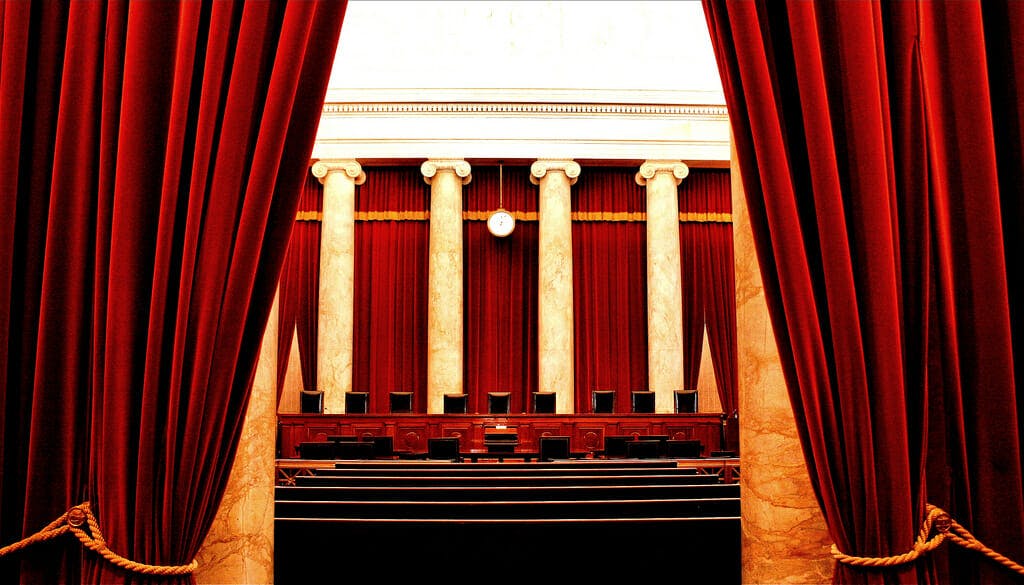After Senate Republicans invoked a “nuclear option” to get him confirmed, Justice Neil Gorsuch was sworn into the Supreme Court on Monday morning. A controversial nominee from the start, Gorsuch was called a “representative of the late and great Antonin Scalia” by President Donald Trump, prompting concerns from the left that Gorsuch would introduce a conservative interpretation of the Constitution while serving as justice.
But how does Neil Gorsuch stack on LGBTQ issues? Although both the Human Rights Campaign and GLAAD have condemned his nomination, Gorsuch’s record remains largely obscure to most Americans. For LGBTQ citizens and allies, here’s a primer on the newest addition to the Supreme Court.
Neil Gorsuch’s complicated history with the LGBTQ community
Neil Gorsuch thinks there’s a liberal agenda
Gorsuch doesn’t like the activist court. He thinks it neuters the judiciary, turning it into a political battleground that robs the courtroom of its independence from special interest groups.
Particularly, Gorsuch is upset with liberal special interest groups.
“American liberals have become addicted to the courtroom, relying on judges and lawyers rather than elected leaders and the ballot box, as the primary means of effecting their social agenda on everything from gay marriage to assisted suicide to the use of vouchers for private-school education,” Gorsuch wrote for the National Review 12 years ago. “But when judges rule this or that policy unconstitutional, there’s little room for compromise: One side must win, the other must lose.”
Gorsuch thinks an activist court is bad for the left, too. He argued that progressives struggled to gain same-sex marriage wins in the early 2000s because the left was “failing to reach out and persuade the public generally” to support gay marriage, concluding that the American left’s “alliance with trial lawyers and its dependence on constitutional litigation to achieve its social goals risks political atrophy.”
He supports ‘religious freedom’ rulings
During the 10th Circuit’s Hobby Lobby v. Sebelius ruling, Gorsuch sided with Hobby Lobby’s argument that the U.S. government should not be able to force companies to provide contraception and birth control if doing so violates their religious values. Gorsuch said “sincerely held religious beliefs” should not be violated, and that the government cannot make religious people violate their religions, according to the Los Angeles Times.
Ultimately, the Supreme Court ruled 5-4 with Hobby Lobby, setting a precedent for Gorsuch to make similar “religious freedom” rulings on the bench. That could be dangerous for LGBTQ Americans, who traditionally face discrimination in right-leaning states over “religious freedom” claims.
He says it’s not unconstitutional to deny trans people medical care
According to Lambda Legal, Justice Gorsuch has a troubling track record when it comes to trans rights. In 2015, a transgender woman incarcerated with the Oklahoma Department of Corrections argued that the department was violating her constitutional rights by refusing to give her clothes that align with her gender identity and grant her access to hormone replacement therapy. Gorsuch joined a ruling against the argument, suggesting that it isn’t unconstitutional to deny transgender people access to estrogen and testosterone while under duress from gender dysphoria.
That case mirrors a current California plan to grant trans inmates access to personal items that aligns with their gender identity. As trans rights continue to rise up to the federal courts, Gorsuch may be forced to rule on trans rights. If so, his current precedent is troubling, to say the least.
He also believes employers should be able to kick out transgender women over ‘safety concerns’
In the case of Kastl v. Maricopa County Community College, transgender woman Rebecca E. Kastl, a community college faculty member, was not allowed to use women’s restrooms in the school district unless she proved that she had undergone sex reassignment surgery, the National Center for Transgender Equality reports. Gorsuch voted that an employer could call on “safety concerns,” much like “religious freedom,” to prevent transgender women from accessing women’s bathrooms.
As the National Center notes, this ruling was never published, so there’s no legal precedent for using “safety concerns” to kick out transgender men and women from bathrooms. But Gorsuch nearly set a dangerous precedent that could have drastically set back transgender rights. It’s safe to say a similar ruling could happen again as part of the Supreme Court.
However, Gorsuch argues transgender people can claim sex discrimination under Title VII
The Williams Institute at the UCLA School of Law published a report detailing Neil Gorsuch’s LGBTQ history on the bench. And while examining Kastl, the institute made an important point: Gorsuch argued that, under Title VII, transgender employees can claim sex discrimination on the basis of gender stereotyping. That is, denying public facilities to transgender women because one believes women are solely cisgender is illegal.
Sound familiar? In two recent major rulings protecting LGBTQ citizens under both the Fair Housing Act and Civil Rights Act, federal courts decided that LGBTQ plaintiffs were discriminated against based on sex stereotyping. Gorsuch may be inclined to agree in some cases, if he agreed under Kastl that transgender people can be legally discriminated against under sex stereotyping.
In summary, while Gorsuch thinks claiming “safety concerns” in general is not discriminatory, he agrees that discriminating based on trans status itself is unconstitutional. The question isn’t whether a transgender person is a denied a bathroom, Gorsuch suggests: it’s why they were denied. That’s a complicated area that could lead to a variety of unpredictable rulings from the justice.
On a personal level, Gorsuch doesn’t appear homophobic
Gorsuch may be an unknown to many, but he doesn’t seem to be against gay marriage in his personal life. The Huffington Post reports that gay law clerk Joshua Goodbaum was well-received by Gorsuch during the week of his marriage. Gorsuch called the marriage “a wonderful thing,” and Goodbaum confirmed that he personally “never felt the least whiff from [Gorsuch] of homophobia or intolerance toward gay people.”
While that doesn’t excuse Gorsuch from his more anti-LGBTQ arguments on the bench, it does mean that the latest Supreme Court justice is a complicated figure. When it comes specifically to gay and lesbian rights, it seems more likely that Gorsuch is driven by his conservative perspective on government more than anything else.
His personal views on transgender rights, meanwhile, remain a mystery, with most clues appearing negative—though he does appear to have some wiggle room for ruling in support of trans anti-discrimination policies, at least in some cases.
The verdict
Is Neil Gorsuch friendly toward LGBTQ Americans? Well, he’s not necessarily doing them any favors. He’s against an activist court—despite de facto playing that role through Hobby Lobby—and he thinks liberals are ruining the courts by turning them into a political battleground. Gorsuch also clearly has no idea why transgender people seek out medical intervention (i.e., to inhibit gender dysphoria’s debilitating effects). He also thinks trans people can be theoretically banned from bathrooms over “safety concerns.” So as one of the most powerful judges in the nation, that’s a scary thought for transgender Americans.
However, Justice Gorsuch doesn’t personally appear to be homophobic. And he’s certainly open to the idea that transgender people can receive legal protections under Title VII, even if he has never personally ruled in favor of trans Americans. His legal views, while tinged with conservative support for religious freedom, also smack of libertarian values that are somewhat flexible. That makes him into a bit of a maverick: slippery on social issues, but occasionally siding with the left over the right.
In that way, while historically conservative, Gorsuch isn’t a major defeat for LGBTQ Americans: He’s just another obstacle that needs to be overcome.



